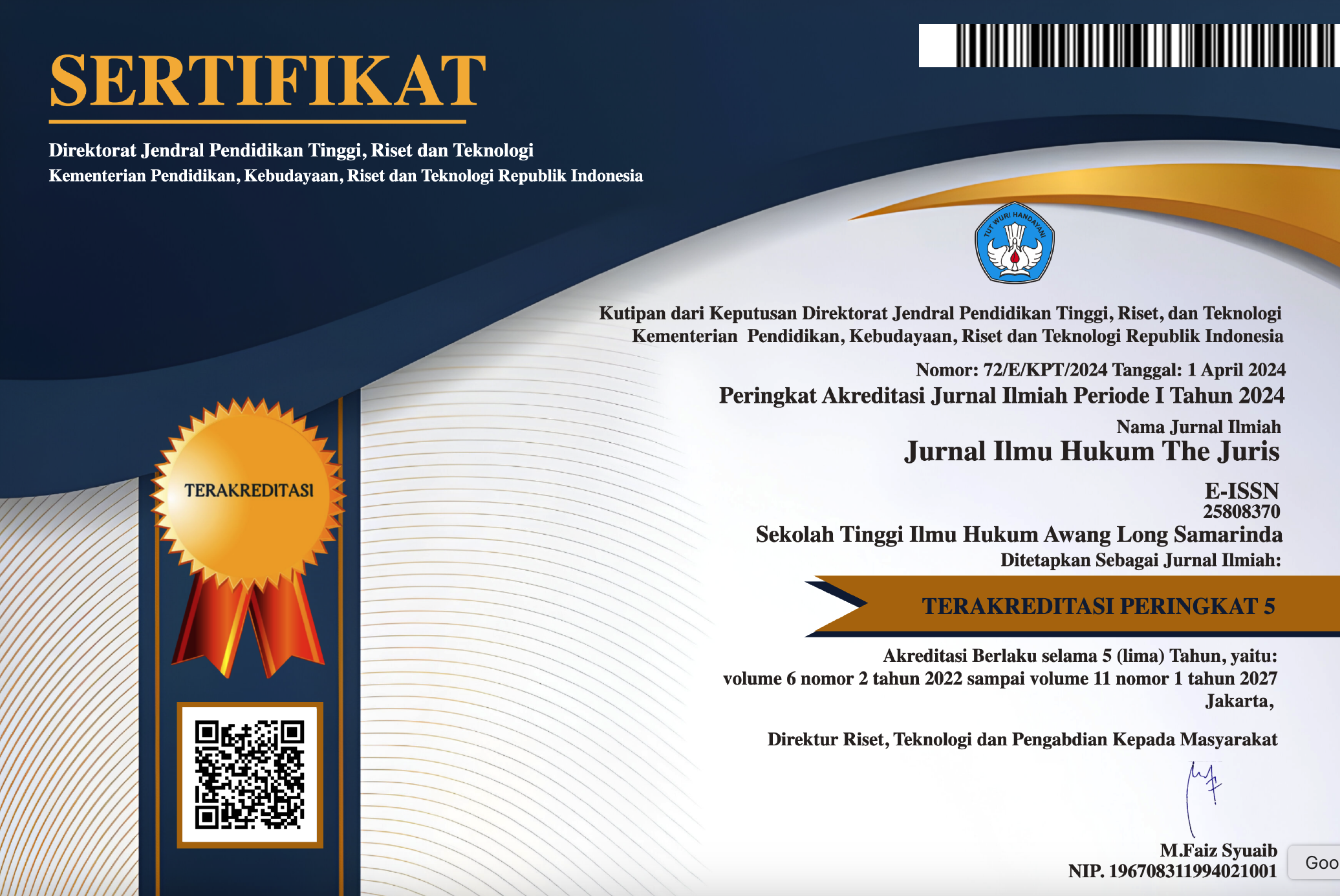KEWENANGAN MAHKAMAH KONSTITUSI DALAM PENYELESAIAN SENGKETA PEMILU BERDASARKAN HUKUM POSITIF INDONESIA
Abstract
The Constitutional Court provides the widest possible opportunity for the entire community to make optimal use of the existence of the Constitutional Court in the constitutional system. By developing the procedural process in a better direction, which is carried out in a modern, fast, simple and cost-free manner, which is related to trial management, case time and simple procedures in submitting and examining applications. The purpose of this research is to analyze the authority of the Constitutional Court in resolving election disputes based on Indonesian positive law. The method used is normative legal research. Based on the research results, it is known that the Authority of the Constitutional Court in Resolving Election Disputes Based on Indonesian Positive Law is that the General Election Commission is one of the state institutions that is given the authority by law to form its own legal products of statutory regulations, namely in the form of General Election Commission Regulations. Seeing that its position is actually outside the hierarchy of statutory regulations, the position of the General Election Commission Regulation in the legal system in Indonesia automatically becomes very abstract because the material content contained in the General Election Commission Regulation does not fully apply to all parties and the legal force of the Commission Regulation General Elections only apply in the implementation of Regional Head Elections and General Elections so that their binding force cannot apply fully in general. The basic reasons that became the reference for why the authority for regional election disputes was finally transferred from the Supreme Court to the Constitutional Court were, firstly, seeing that the regional elections were basically included as an election regime, so that disputes over election results had to be resolved at the Constitutional Court in accordance with the 1945 Constitution. Second, this was contained in the 1945 Constitution Article 24 C paragraph 1 states that the Constitutional Court is an institution that has the authority to adjudicate at the first and last level whose decisions are final.
Downloads
References
Asshiddiqie, J. (2010). Konstitusi dan konstitusionalisme Indonesia. Jakarta: Sinar Grafika.
Bass, K. G., & Choudry, S. (2013). Constitutional review in new democracies. Democracy Reporting International.
Eka Muji Diliwiyana. (2022). KEPASTIAN HUKUM PEMBENTUKAN BADAN BANK TANAH PASCA PUTUSAN MAHKAMAH KONSTITUSI. The Juris, 6(1), 204-214. https://doi.org/10.56301/juris.v6i1.430
Gaffar, J. M. (2013). Politik hukum pemilu. Jakarta: Konstitusi Press.
Irayadi. (2022). IMPLIKASI PUTUSAN MAHKAMAH KONSTITUSI NOMOR 91/PUU-XVIII/2020 TERHADAP SEKTOR PENGUPAHAN. The Juris, 6(1), 101-112. https://doi.org/10.56301/juris.v6i1.421
Jurdi, F. (2018). Pengantar hukum pemilihan umum. Jakarta: Kencana.
Kartika, T. (2019). MAKNA PERMUFAKATAN JAHAT DALAM PASAL 15 UNDANG-UNDANG NOMOR 20 TAHUN 2001 TENTANG PEMBERANTASAN TINDAK PIDANA KORUPSI, DIKAJI DARI HERMENEUTIKA HUKUM (STUDI KASUS PUTUSAN MAHKAMAH KONSTITUSI NOMOR 21/PUU-XIV/2016). The Juris, 3(2), 140-153. https://doi.org/10.56301/juris.v3i2.71
Mahfud MD. (2011). Perdebatan hukum tata negara pasca amandemen konstitusi. Jakarta: Rajawali Pers.
Nugraha, F. K. (2016). Peran MK dalam pilkada. Jurnal Transpormatif, 2(1).
Program Pascasarjana Universitas Lancang Kuning. (2019). Pedoman penulisan tesis Program Magister Ilmu Hukum. Pekanbaru: Pascasarjana Universitas Lancang Kuning.
Santoso, T. (2014). Penegakan hukum pemilu: Praktik pemilu 2004, kajian pemilu 2009–2014. Jakarta: Perludem–USAID DRSP.
Soehino. (2007). Ilmu negara. Yogyakarta: Liberty.
Wibowo, A. (2013). Menata ulang sistem penyelesaian sengketa dan pelanggaran pilkada. Dalam Demokrasi lokal (pp. xx–xx). Jakarta: Konstitusi Press.
Copyright (c) 2025 Raja Ferza Fakhlevi, Eddy Asnawi, Bagio Kadaryanto

This work is licensed under a Creative Commons Attribution-ShareAlike 4.0 International License.







